Related Research Articles

The Environmental Protection Agency (EPA) is an independent agency of the United States government tasked with environmental protection matters. President Richard Nixon proposed the establishment of EPA on July 9, 1970; it began operation on December 2, 1970, after Nixon signed an executive order. The order establishing the EPA was ratified by committee hearings in the House and Senate.

Marilyn Neoma Musgrave, American politician, is a former Republican member of the United States House of Representatives who served from 2003 to 2009, representing the 4th District of Colorado.

The Clean Water Act (CWA) is the primary federal law in the United States governing water pollution. Its objective is to restore and maintain the chemical, physical, and biological integrity of the nation's waters; recognizing the responsibilities of the states in addressing pollution and providing assistance to states to do so, including funding for publicly owned treatment works for the improvement of wastewater treatment; and maintaining the integrity of wetlands.

Carol Martha Browner is an American lawyer, environmentalist, and businesswoman, who served as director of the White House Office of Energy and Climate Change Policy in the Obama administration from 2009 to 2011. Browner previously served as Administrator of the Environmental Protection Agency (EPA) during the Clinton administration from 1993 to 2001. She currently works as a Senior Counselor at Albright Stonebridge Group, a global business strategy firm.
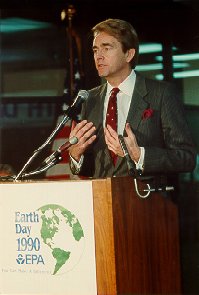
William Kane Reilly was Administrator of the Environmental Protection Agency under President George H. W. Bush. He has served as president of World Wildlife Fund, as a founder or advisor to several business ventures, and on many boards of directors. In 2010, he was appointed by President Barack Obama co-chair of the National Commission on the BP Deepwater Horizon Oil Spill and Offshore Drilling to investigate the oil spill in the Gulf of Mexico.
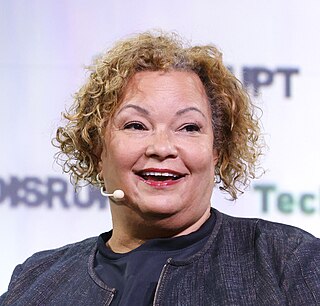
Lisa Perez Jackson is an American chemical engineer who served as the administrator of the United States Environmental Protection Agency (EPA) from 2009 to 2013. She was the first African American to hold that position.
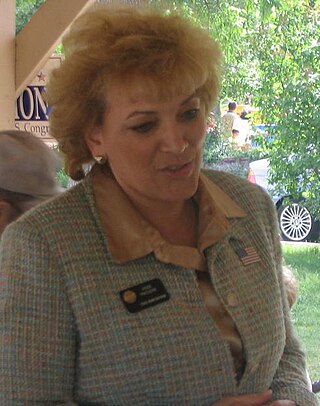
Angela Veronica "Angie" Paccione is an American politician and former Colorado legislator who was a 2006 Congressional candidate.

CH2M, earlier CH2M Hill, was an engineering company that provided consulting, design, construction, and operations services for corporations and governments. The company was organized in Corvallis, Oregon, and headquartered at 9191 South Jamaica Street, Englewood, Colorado. In December 2017, the company was acquired by Jacobs Engineering Group.
Water supply and sanitation in the United States involves a number of issues including water scarcity, pollution, a backlog of investment, concerns about the affordability of water for the poorest, and a rapidly retiring workforce. Increased variability and intensity of rainfall as a result of climate change is expected to produce both more severe droughts and flooding, with potentially serious consequences for water supply and for pollution from combined sewer overflows. Droughts are likely to particularly affect the 66 percent of Americans whose communities depend on surface water. As for drinking water quality, there are concerns about disinfection by-products, lead, perchlorates, PFAS and pharmaceutical substances, but generally drinking water quality in the U.S. is good.

Elizabeth Helen Markey is a former American politician who served as a member of the United States House of Representatives for Colorado's 4th congressional district from 2009 to 2011. She also served as assistant secretary for intergovernmental affairs in the United States Department of Homeland Security. She is a member of the Democratic Party.

Reorganization Plan No. 3 was a United States presidential directive establishing the Environmental Protection Agency (EPA), effective December 2, 1970. The order, published in the Federal Register on October 6, 1970, consolidated components from different federal agencies to form the EPA, "a strong, independent agency" that would establish and enforce federal environmental protection laws.

The 2008 congressional elections in Colorado were held on November 4, 2008 to determine who will represent the state of Colorado in the United States House of Representatives, coinciding with the presidential and senatorial elections. Representatives are elected for two-year terms; those elected served in the 111th Congress from January 3, 2009 until January 3, 2011.
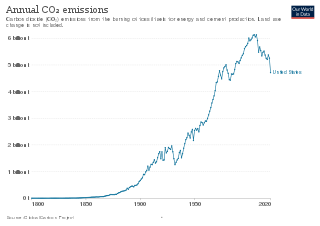
The environmental policy of the United States is a federal governmental action to regulate activities that have an environmental impact in the United States. The goal of environmental policy is to protect the environment for future generations while interfering as little as possible with the efficiency of commerce or the liberty of the people and to limit inequity in who is burdened with environmental costs. As his first official act bringing in the 1970s, President Richard Nixon signed the U.S. National Environmental Policy Act (NEPA) into law on New Years Day, 1970. Also in the same year, America began celebrating Earth Day, which has been called "the big bang of U.S. environmental politics, launching the country on a sweeping social learning curve about ecological management never before experienced or attempted in any other nation." NEPA established a comprehensive US national environmental policy and created the requirement to prepare an environmental impact statement for "major federal actions significantly affecting the quality of the environment." Author and consultant Charles H. Eccleston has called NEPA the world's "environmental Magna Carta".

The Clean Air Act (CAA) is the United States' primary federal air quality law, intended to reduce and control air pollution nationwide. Initially enacted in 1963 and amended many times since, it is one of the United States' first and most influential modern environmental laws.

Nutrient pollution, a form of water pollution, refers to contamination by excessive inputs of nutrients. It is a primary cause of eutrophication of surface waters, in which excess nutrients, usually nitrogen or phosphorus, stimulate algal growth. Sources of nutrient pollution include surface runoff from farm fields and pastures, discharges from septic tanks and feedlots, and emissions from combustion. Raw sewage is a large contributor to cultural eutrophication since sewage is high in nutrients. Releasing raw sewage into a large water body is referred to as sewage dumping, and still occurs all over the world. Excess reactive nitrogen compounds in the environment are associated with many large-scale environmental concerns. These include eutrophication of surface waters, harmful algal blooms, hypoxia, acid rain, nitrogen saturation in forests, and climate change.

Robert Perciasepe is an American former government official who currently serves as a senior adviser to McKinsey and Company and the nonprofit Center for Climate and Energy Solutions, following his role as President of the organization. He served as the Deputy Administrator and Acting Administrator of the U.S. Environmental Protection Agency during the administration of Barack Obama.

Regina McCarthy is an American air quality expert who served as the first White House national climate advisor from 2021 to 2022. She previously served as the thirteenth Administrator of the Environmental Protection Agency from 2013 to 2017.
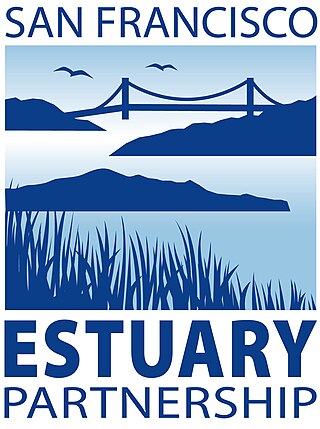
The San Francisco Estuary Partnership (Partnership) is one of the 28 National Estuary Programs created in the 1987 Amendments to the Clean Water Act. The Partnership is a non-regulatory federal-state-local collaboration working to restore water quality and manage the natural resources of the San Francisco Bay-Sacramento–San Joaquin River Delta estuary. The Partnership works with over 100 municipalities, non-profits, governmental agencies, and businesses and helps develop, find funding for, and implement over 40 projects and programs aimed at improving the health of the estuary. The partnership either directly implements these projects, or administers and manages grants, holds educational workshops and highlights project results. The Partnership is also the official representative for the San Francisco Bay region to the Most Beautiful Bays in the World.

The Clean Water Rule is a 2015 regulation published by the U.S. Environmental Protection Agency (EPA) and the United States Army Corps of Engineers (USACE) to clarify water resource management in the United States under a provision of the Clean Water Act of 1972. The regulation defined the scope of federal water protection in a more consistent manner, particularly over streams and wetlands which have a significant hydrological and ecological connection to traditional navigable waters, interstate waters, and territorial seas. It is also referred to as the Waters of the United States (WOTUS) rule, which defines all bodies of water that fall under U.S. federal jurisdiction. The rule was published in response to concerns about lack of clarity over the act's scope from legislators at multiple levels, industry members, researchers and other science professionals, activists, and citizens.

Michael Stanley Regan is an American environmental regulator. He has been serving as the 16th administrator of the Environmental Protection Agency since March 11, 2021. He is the first African American man to serve in the role.
References
- ↑ "EPA shredding brings charges of 'Sewergate'". JSTOR 25041272 . Retrieved July 16, 2021.
- ↑ "The Process and Significance of Political Scandals: A Comparison of Watergate and the "Sewergate"". JSTOR 800705 . Retrieved July 16, 2021.
- ↑ "Guide to the Papers of Frederic A. Eidsness, Jr" . Retrieved July 16, 2021.
- ↑ "Washburn Award" . Retrieved July 16, 2021.
- ↑ "Organization of EPA's Region 4 Office in Atlanta" . Retrieved July 16, 2021.
- ↑ "Friends of the River" . Retrieved July 16, 2021.
- ↑ "Larimer-Weld Regional Historic Site Inventory and Preservation Strategy Plan" . Retrieved July 16, 2021.
- ↑ "North Front Range Water Quality Planning Association (NFRWQPA)" . Retrieved July 16, 2021.
- ↑ Nominations. OL 3141440M . Retrieved July 16, 2021.
- ↑ "Eidsness to be Nominated". JSTOR 25041272 . Retrieved July 16, 2021.
- ↑ "Reagan Appointments and Nominations" . Retrieved July 16, 2021.
- ↑ "Nomination Approved". JSTOR 25041272 . Retrieved July 16, 2021.
- ↑ "Three Key Appointments EPA Times No. 1, May 7, 1982" . Retrieved July 16, 2021.
- ↑ Eidsness, Frederick A.; Feliciano, Donald; Flynn, Kevin (1982). "EPA Assistant Administrator Frederick A. Eidsness, Jr.: Reasonable People Will Make Reasonable Decisions". Journal (Water Pollution Control Federation). 54 (7): 1051–1056. JSTOR 25041622 . Retrieved July 16, 2021.
- ↑ "Water For Living" (PDF). Retrieved July 16, 2021.
- ↑ "MacNeil/Lehrer NewsHour" . Retrieved July 16, 2021.
- ↑ "Water Quality Report Planned EPA Times No. 16, Dec, 6, 1982" . Retrieved July 16, 2021.
- ↑ "C-SPAN Congressional Debate" . Retrieved July 16, 2021.
- ↑ "District debate offers insight" . Retrieved July 16, 2021.
- ↑ "Total Raised and Spent" . Retrieved July 16, 2021.
- ↑ "Eidsness Makes it Official: He's a Democrat" . Retrieved July 16, 2021.
- ↑ "Eidsness Withdraws from Race" . Retrieved July 16, 2021.
- ↑ "Black Rice Project" . Retrieved July 16, 2021.